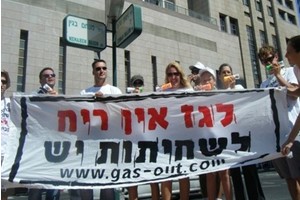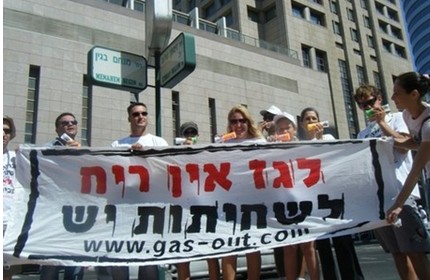
In an explanatory note that proposed the discussion, Khenin asked that the committee examine the placement of gas-refining sites at Hagit in the Megiddo region and a second facility in Emek Hefer. He explained that the placement of these facilities could jeopardize the environment and the safety of the area’s residents.
Amid local protest over the placement of future natural gas treatment facilities in the country’s North, the Knesset Internal Affairs Committee called upon the National Council for Planning and Building to clarify why alternative, at-sea options have not been more thoroughly examined.
Organized by MKs Dov Khenin (Hadash) and Isaac Herzog (Labor), a contentious debate on the location of gas refining facilities occurred on Tuesday at a committee session. Many mayors from the affected region and residents of these communities were present.

Demonstration in Tel-Aviv against the land location of gas refining facilities (Photo: Green Course)
Stressing that treatment facilities at sea would be preferable to similar plants onshore, Herzog asked why the National Council for Planning and Building had not adopted professional recommendations on this issue. Only days after the election results for the 19th Knesset came in, the Council made a decision to promote the Megiddo and Emek Hefer sites, the explanatory note said.
“What bothers me is the safety risk,” Khenin added, expressing concern about causing economic and social harm to vulnerable populations. “In any case, further gas treatment will be needed at sea, so why not finish the repair at sea”.
The National Council for Planning and Building decided on the land and sea treatment combination, but during its last session on the subject, the council considered five different options – all onshore, explained Ronit Mazar, a planning director there. Asked by Khenin why the Council did not examine a marine option, Mazar responded that the Energy and Water Ministry and the Natural Gas Authority had recommended that the Council reject this option at this stage. However, the program theoretically enables treatment of the gas both at sea and onshore, she explained.
As regards regional representatives, Yokne’am Mayor Simon Alfasi complained that he has not received summons to all of the National Council meetings on the gas treatment issue, even though Yokne’am has become a thoroughfare for polluting pipelines. “We were talking about a small facility, but this is going to be a monster of 260 dunams ,” Alfasi said.
The area’s activists against the facilities – who collectively call themselves the Carmel-Menashe Struggle – will continue their efforts with a large demonstration in Jerusalem, the group said. Liron Shapira, the head of the group, praised the committee members for their understanding of the ramifications of the decision to place the facilities in their territory. “Today it has been shown that the full marine alternative has never been examined in depth,” Shapira said. “The planning bodies must stop the process until they examine the full marine alternative – an examination that I am sure will show that this is a possible alternative, adopted with success around the world,” added.


